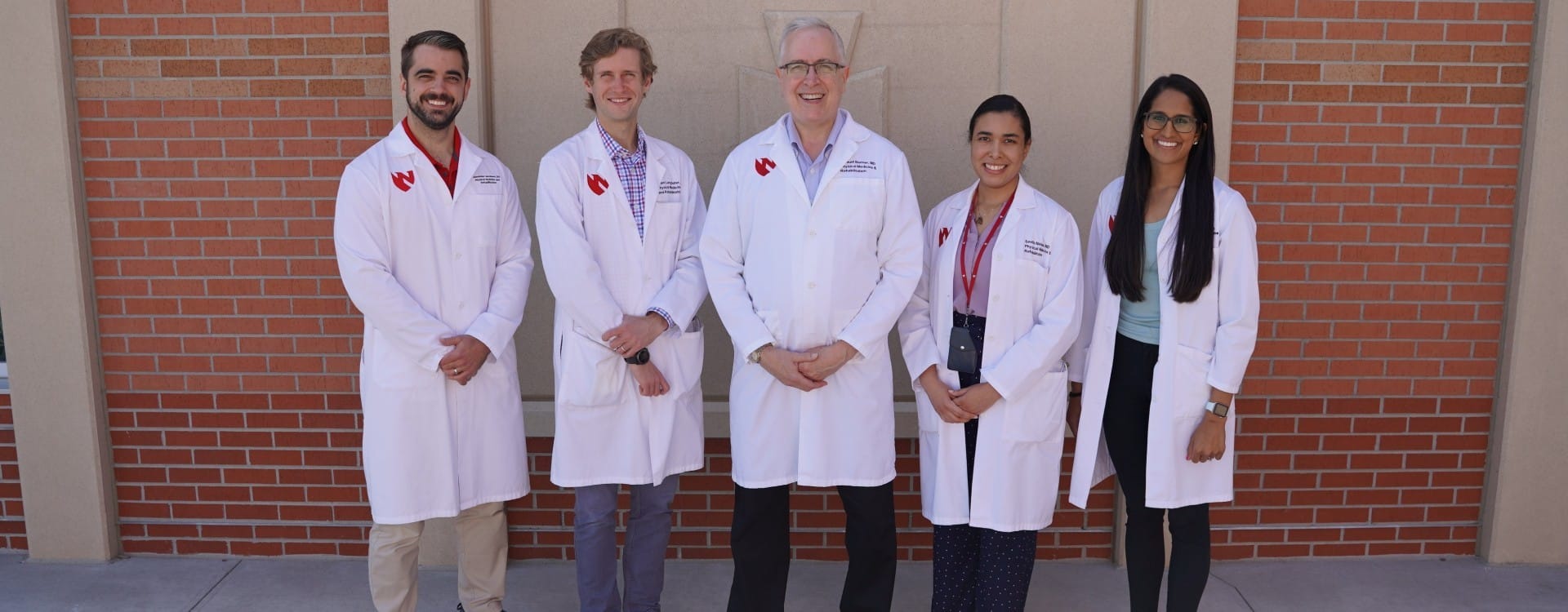Congratulations to the 2022 class of the Physical Medicine and Rehabilitation (PM&R) Residency Program. Graduate physiatrists include Alexander Jacobsen, D.O.; Seela Nimmo, M.D.; Brett Rosauer, M.D.; and Sonia Shah, M.D. For the past four years, these four resident physicians have been hard at work collaborating with Madonna care teams to help restore patients recovering from illness or injury.
The program is in partnership with the University of Nebraska Medical Center (UNMC) and its clinical partner, Nebraska Medicine. Samuel Bierner, M.D., serves as professor and department chair and is the Madonna Rehabilitation medical director for the Omaha Campus. Michael Weaver, D.O. is the program director.
The only PM&R program in Nebraska, it’s also the first of its kind in a five-state upper Midwest region, with Madonna’s Omaha Campus serving as the primary training hospital for all 16 residents working with patients, both adults and kids, recovering from a stroke, brain injuries, spinal cord injuries and other complex medical issues. In addition, recently the Accreditation Council for Graduate Medical Education has approved a brain injury fellowship program which is expected to kick off in July.
For those who are finishing up their residency, they’ve spent the past four years developing skills while raising families and forging friendships with co-residents and their families. As the first full class, they’ve also helped lay the groundwork for the program and training for future physiatrists. Recently, we asked them about their experience including the legacy they hope to leave, their next steps and what they love about Omaha, and here’s what they told us.
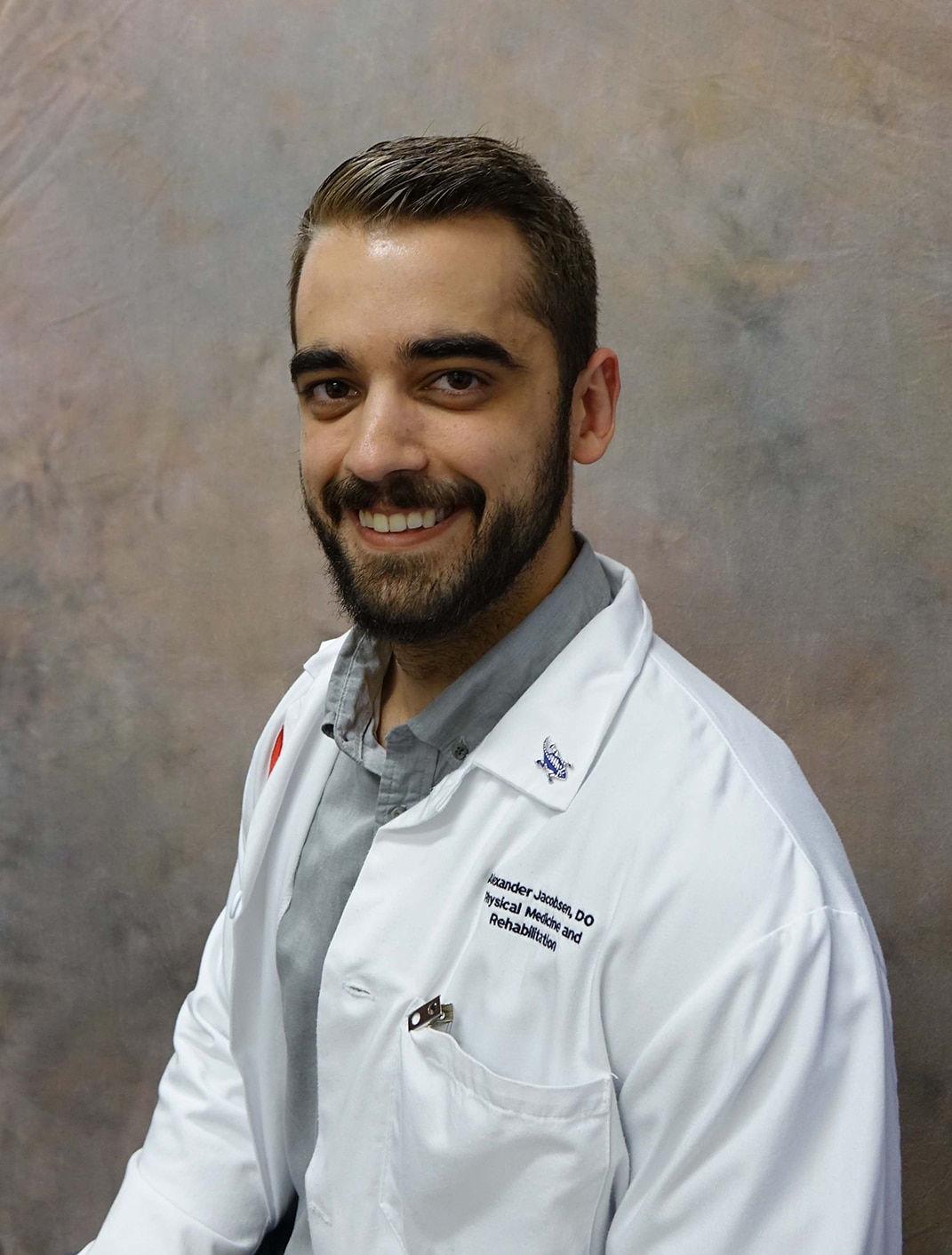
<strong>Alexander Jacobsen, D.O.</strong>
Tell me what you’ve gained through the PM&R residency program?
I came to this program because I felt like I would get broad exposure and training across the entire spectrum of Physical Medicine and Rehabilitation. While there is always more to learn, I feel like my training is solid and would feel comfortable transitioning to nearly any inpatient or outpatient environment.
You’re the first full class to graduate. What’s that like?
They say in residency that the days take years, the months take decades, and the years take seconds. That is exactly how it feels. Considering we are four years later down this road, it’s a bittersweet mixture of being prepared to move on into practice, while also thinking “how in the world are we already here.”
How did working at Madonna impact your residency?
The unique and special thing about PM&R as a field is the multidisciplinary approach and working so closely with so many other members of the care team. The staff at Madonna from the top-down have been great to learn from and work with across every registered nurse, nurse aide, physical therapist, occupational therapist, speech-language therapist, psychologist, custodial staff, chaplain, case manager, social worker and absolutely not least of all my co-residents.
What are your next steps?
I will be moving to Tyler Texas to complete a one-year sports medicine fellowship. After that, who knows!
What’s the best part of living in Omaha?
Having grown up in Omaha and gone away for 10 years of school, it was great to come back and be around family in this phase of my life. My three daughters were born during residency, and having my parents, and siblings, as well as new nieces and nephews in the area, has been a blessing.
The program now has a BI fellowship. What impact do you think that will have on the program? Fellows? Patients?
Seeing how there are so few BI fellowships nationally, it certainly elevates the program even more onto the national stage. Fellows are going to be able to take advantage of all the great therapists and therapy approaches used by Madonna, and certainly, patients will benefit from having additional sub-specialty expertise that is so specifically invested in their care.
What’s the legacy you hope to leave?
In my time we have seen the residency program grow year over year, and now with the full 16 resident allotment, I can only hope the patients and hospital are seeing the tangible benefits of having us involved.
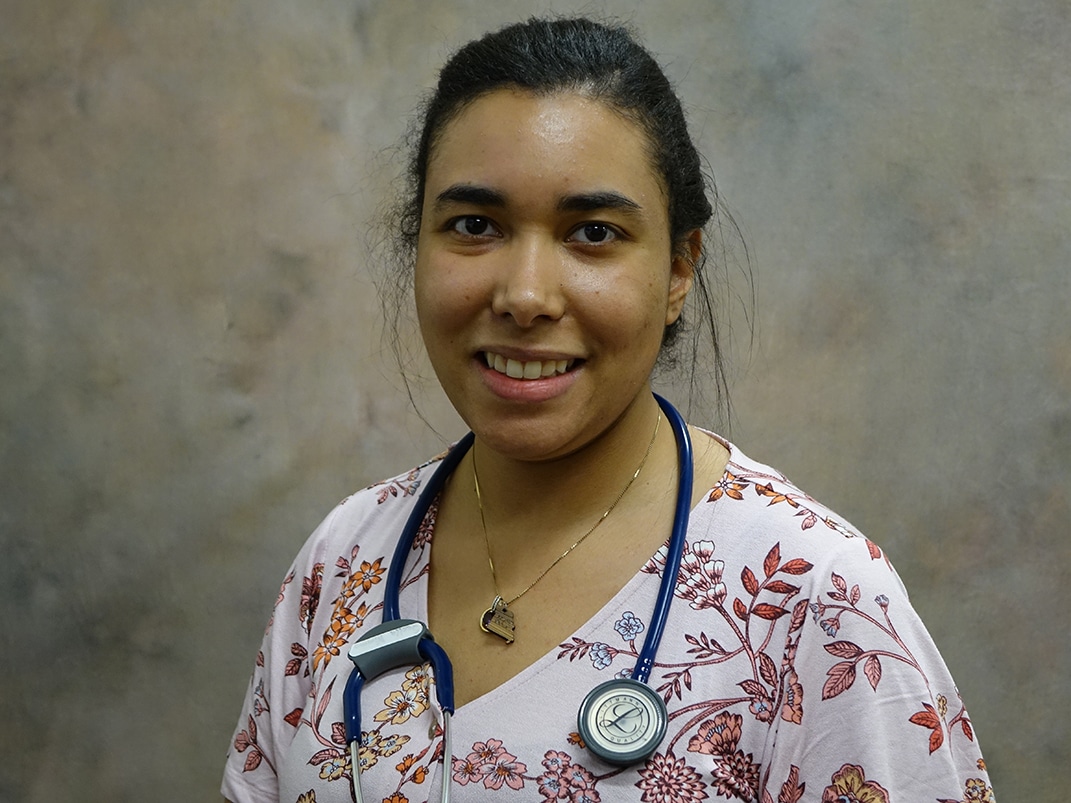
<strong>Seela Nimmo, M.D.</strong>
Tell me what you’ve gained through the PM&R residency program?
Through PM&R residency I have gained a deeper understanding of the field of physiatry. Additionally, I have been able to meet and collaborate with some amazing people including my co-residents, patients and their families, and various staff affiliated with both Madonna and UNMC.
You’re the first full class to graduate. What’s that like?
I definitely am proud of everyone in our program, especially the current fourth years, for getting to this
point and working together on making ongoing improvements. I have been in Omaha for some time now, so it is bittersweet to be moving on but I am looking forward to a new adventure.
How did working at Madonna impact your residency?
I think working at Madonna throughout residency helped provide a substantial amount of the fundamental core training necessary for physiatry, particularly the inpatient rotations such as stroke and traumatic brain injury. All of the staff and care teams were wonderful to work with and provided a welcoming atmosphere for the PM&R residents to train.
What are your next steps?
I will be doing a fellowship in pediatric rehabilitation at the University of Michigan in Ann Arbor.
What’s the best part of living in Omaha?
The best part of living in Omaha is having the smaller city vibe with big-city attractions/amenities.
The program now has a BI fellowship. What impact do you think that will have on the program? Fellows? Patients?
I think once there are fellows participating in the BI fellowship, it will strengthen the PM&R residency program by providing another resource for upper-level expertise. For fellows, hopefully, it will provide the specialty training that they are looking for and ultimately provide patients with more access to physicians trained in brain injury medicine.
What’s the legacy you hope to leave?
If anything, I hope that the PM&R residency program continues to grow and make positive strides in the future. While it is still a relatively new program at this point, hopefully with each successive class bringing their fresh perspectives/unique insights it will only become stronger.
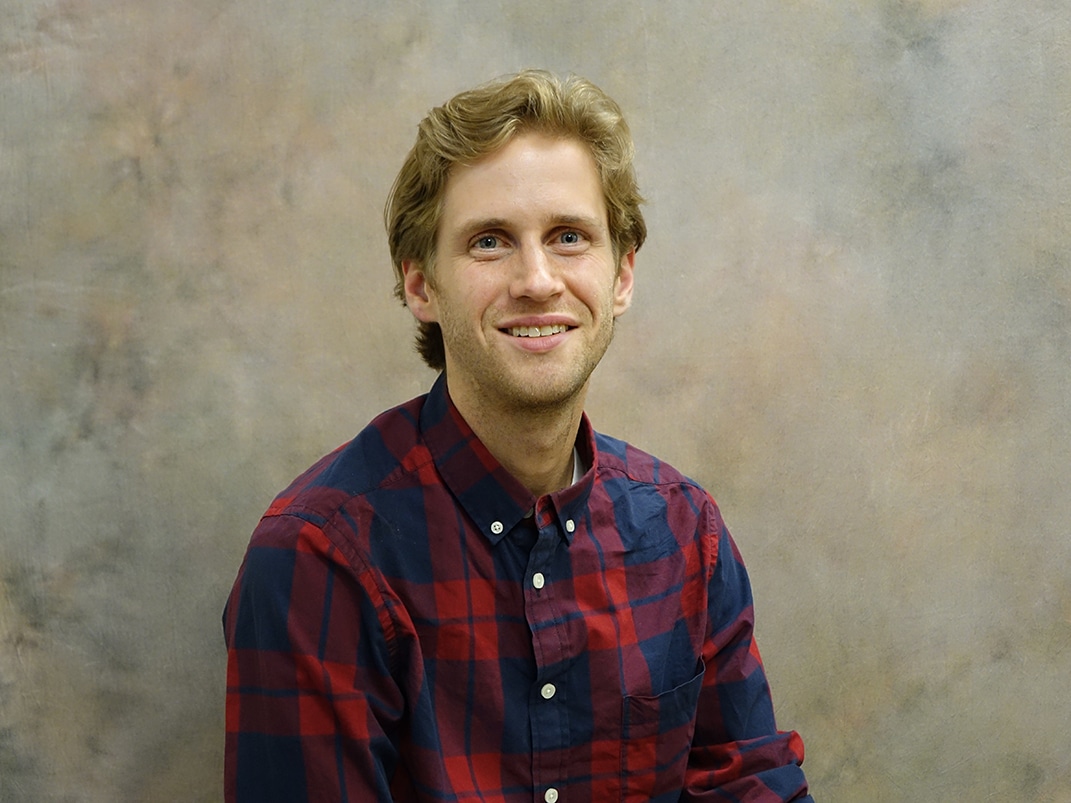
<strong>Brett Rosauer, M.D.</strong>
Tell me what you’ve gained through the PM&R residency program?
The biggest thing is my improvement in communicating with patients who present with a multitude of impairments and disabilities. It is tough to envision what the patient is going through daily based on the hand that they were dealt, but I feel like this program does well in preparing us for these conversations.
You’re the first full class to graduate. What’s that like?
I would be lying if I said that it was always a smooth process! There have been some road bumps along the way, but it is good to see things improving over the years. The attendings and program leadership do want this program to succeed, and it is nice to see that on a personal level.
How did working at Madonna impact your residency?
The nursing staff, pharmacy, aides, therapists, social workers, case managers, and neuropsych team all were great to work with and they made our training easier to handle. There was always someone that I could reach out to if specific questions regarding a patient came up.
What are your next steps?
I’m going back to the University of Iowa to work at their Inpatient Acute Rehab Hospital.
What’s the best part of living in Omaha?
It is big enough to offer numerous options for entertainment/recreation outside of work but not too big where traffic bogs everything down.
The program now has a BI fellowship. What impact do you think that will have on the program? Fellows? Patients?
I’m hopeful that it will allow the residents to have an even more immersive experience w/ the brain injury patients as this program expands its academic offerings.
What’s the legacy you hope to leave?
That’s a tough one, I guess just making sure to prioritize time outside of the hospital doing things that you enjoy.
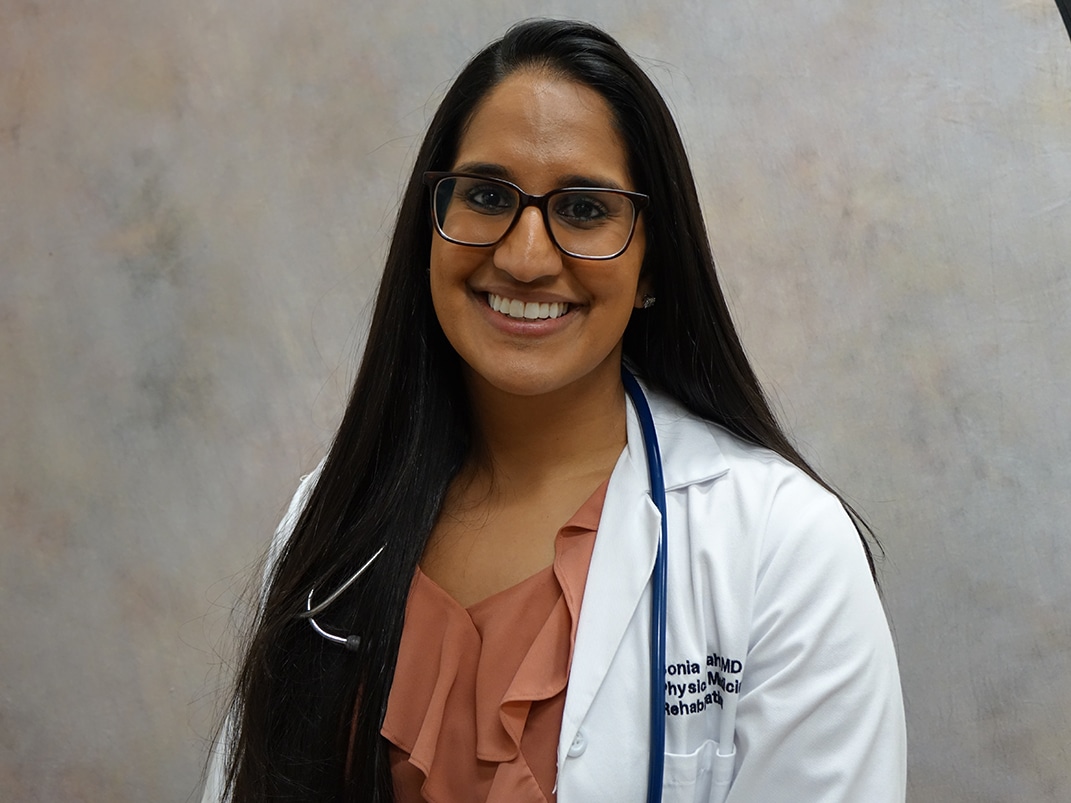
Tell me what you’ve gained through the PM&R residency program?
Everything I have learned about PM&R has been because of this program. This program has helped me build a foundation of knowledge and has given me the skill set necessary to start my career.
You’re the first full class to graduate. What’s that like?
There were definitely some road bumps along the way, but that was to be expected. It was cool getting to help develop the program and make changes to help the future classes. I am very thankful for my co-residents because they helped me every step along the way!
How did working at Madonna impact your residency?
Madonna admits a wide variety of pathology that was great for us to be able to get exposure to not only the bread and butter of PM&R, but also some of the other obscure pathology that might not be seen everywhere.
Where are you headed next?
I will be doing a spinal cord injury fellowship at the Medical College of Wisconsin in Milwaukee, Wisconsin next year.
What’s the best part of living in Omaha?
The food and the people! Omaha is a surprising foodie town and I love it. The people of Omaha are honestly some of the nicest people I have met.
The program now has a BI fellowship. What impact do you think that will have on the program? Fellows? Patients?
I think this will only better the program and the lives of our patients with brain injuries. Having a fellowship here will allow for more learning for the residents, but more importantly, will allow our brain injury patients to be better managed and followed over time.
What’s the legacy you hope to leave?
We are already leaving as the first full graduating class from this program, which is a pretty good legacy to leave behind. I just hope the program continues to develop and grow and hopefully we helped create a good foundation for it to do so.





